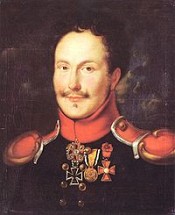La Motte-Fouqué Friedrich Heinrich Karl Freiherr de

Friedrich Heinrich Karl de la Motte, Baron Fouqué (February 12, 1777 – January 23, 1843) was a German writer of the romantic movement. He was born at Brandenburg an der Havel, of a family of French Huguenot origin, as evidenced in his family name. His grandfather, Heinrich August de la Motte Fouqué, had been one of Frederick the Great's generals and his father was a Prussian officer. Although not originally intended for a military career, Friedrich de la Motte Fouqué ultimately gave up his university studies at Halle to join the army, and he took part in the Rhine campaign of 1794. The rest of his life was devoted mainly to literary pursuits. He was introduced to August Wilhelm Schlegel, who deeply influenced him as a poet (mich gelehret Maß und Regel | Meister August Wilhelm Schlegel) and who published Fouqué's first book, Dramatische Spiele von Pellegrin, in 1804. Fouqué's first marriage was unhappy and soon ended in divorce. His second wife, Karoline von Briest (1773-1831), enjoyed some reputation as a novelist in her day. After her death Fouqué married a third time. Some consolation for the ebbing tide of popular favour was afforded him by the munificence of Frederick William IV of Prussia, who granted him a pension which allowed him to spend his later years in comfort. He died in Berlin in 1843. After Dramatische Spiele von Pellegrin, his second work, Romanzen vom Tal Ronceval (1805), showed more plainly his allegiance to the romantic leaders, and in the Historie vom edlen Ritter Galmy (1806) he versified a 16th century romance of medieval chivalry. Sigurd der Schlangentödter, ein Heldenspiel in sechs Abentheuren (1808), was the first modern German dramatization of the Nibelung legend combining Icelandic sources such as the Volsunga Saga and the Middle High German Nibelungenlied. That play and its two sequels Sigurds Rache (1809) and Aslauga (1810) were published together under the title Der Held des Nordens in 1810. The trilogy attracted attention to him, and influenced considerably subsequent versions of the story, such as Friedrich Hebbel's Nibelungen and Richard Wagner's Der Ring des Nibelungen. These early writings indicate the lines which Fouqué's subsequent literary activity followed; his interests were divided between medieval chivalry on the one hand and northern mythology on the other. In 1813, the year of the rising against Napoleon, he again fought with the Prussian army, and the new patriotism awakened in the German people left its mark upon his writings. Between 1810 and 1815, Fouqué's popularity was at its height; the many romances and novels, plays and epics, which he turned out with extraordinary rapidity, appealed exactly to the mood of the hour. The earliest of these are the best -- Undine, which appeared around 1811, being, indeed, one of the most charming of all German Märchen and the only work by which Fouqué's memory still lives today. A more comprehensive idea of his powers may, however, be obtained from the two romances Der Zauberring (1813) and Die Fahrten Thiodolfs des Isländers (1815). From 1820 onwards the quality of Fouqué's work deteriorated, partly owing to the fatal formal ease with which he wrote, and he failed to keep pace with the changes in German taste. He clung tenaciously to the paraphernalia of romanticism; but in the cold, sober light of the post-romantic age, these appeared merely flimsy and theatrical. The vitalizing imaginative power of his early years deserted him, and the sobriquet of a "Don Quixote of Romanticism" which his enemies applied to him was not unjustified. Most of Fouqué's works have been translated, and the English versions of Aslauga's Knight (by Thomas Carlyle), Sintram and his Companions and Undine, have been frequently republished. For Fouqué's life cf. Lebensgeschichte des Baron Friedrich de la Motte Fouqué. Aufgezeichnet durch ihn selbst (Halle, 1840), (only to the year 1813), and also the introduction to Koch's selections in the Deutsche Nationalliteratur. Aslauga's Knight, Sintram and his Companions and Undine are referred to in Jo's Boys by Louisa May Alcott, the final book in the Little Women series, where the story of Aslauga's Knight mirrors the character Dan and his affection for gentle Bess.
do you like this author?
What readers are saying
What do you think? Write your own comment on this book!
write a commentWhat readers are saying
What do you think? Write your own comment on this author!
write a commentWhat readers are saying
What do you think? Write your own comment on this author!
write a commentif you like La Motte-Fouqué Friedrich Heinrich Karl Freiherr de try:
readers also enjoyed
What readers are saying
What do you think? Write your own comment on this author!
write a commentGenre
if you like La Motte-Fouqué Friedrich Heinrich Karl Freiherr de try:
readers also enjoyed
Do you want to exchange books? It’s EASY!
Get registered and find other users who want to give their favourite books to good hands!


